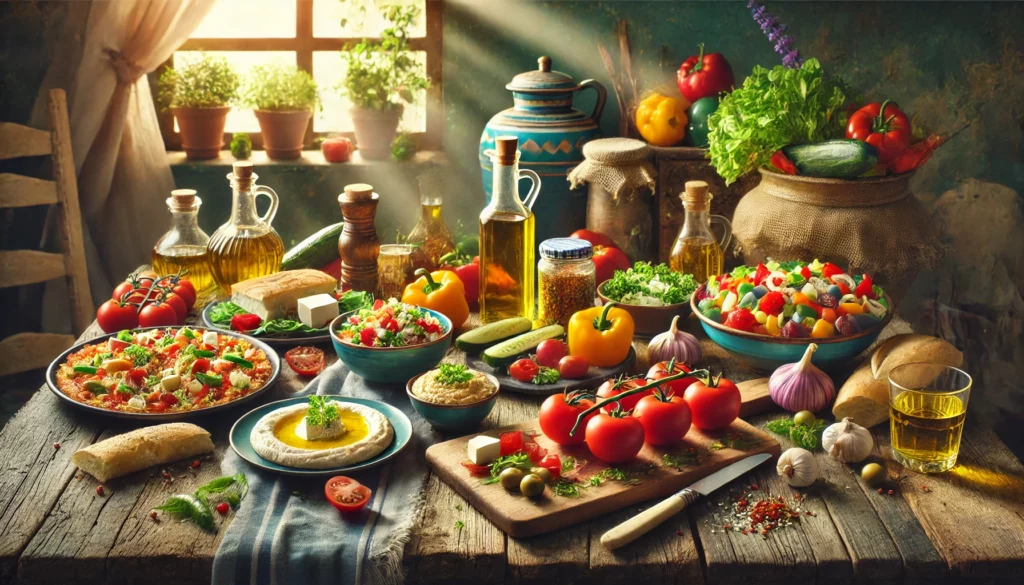Ads
When we think of healthy eating, we automatically associate it with balanced, nutritious dishes that promote well-being.
But have you ever wondered what the healthiest cuisine in the world is?
This is a question that sparks curiosity and, at the same time, leads us to explore the rich food traditions around the globe.
The answer to this question is not simple, as the concept of “healthy” varies by region, culture, and context.
Still, there is unanimity among nutritionists and specialists: the Mediterranean diet is often considered the healthiest.
Ads
Let's understand the reasons that put this cuisine in first place.
Why is Mediterranean Cuisine Considered Healthy?
What makes the Mediterranean diet so special? The answer lies in its combination of fresh ingredients, simple preparation techniques, and a balance of essential nutrients.
Furthermore, this cuisine is deeply connected to the local culture, where meals are seen as moments of social gathering and pleasure.
Proven benefits: Studies show that the Mediterranean diet helps reduce the risk of cardiovascular disease, type 2 diabetes, and certain types of cancer.
It also contributes to weight control and improves mental health.
Main ingredients:
- Extra virgin olive oil: rich in healthy fats and antioxidants.
- Fish and seafood: sources of omega-3.
- Fresh fruits and vegetables: full of vitamins and minerals.
- Whole grains: good source of energy and fiber.
- Nuts and seeds: allies of cardiovascular health.
- Herbs and spices: replace salt, enhancing the flavor of dishes.
Iconic Dishes of Mediterranean Gastronomy
Diversity is one of the strengths of this diet. Here are some typical dishes that exemplify the richness and flavor of the region:
1. Greek Salad Simple, refreshing, and nutritious, this Greek salad combines tomato, cucumber, onion, olives, and feta cheese. All dressed with olive oil and spices.
2. Ratatouille Of French origin, this dish is a mixture of vegetables such as eggplant, zucchini, tomato, and peppers, cooked in olive oil and herbs.
3. Seafood Paella Although associated with Spain, paella varies from region to region. With rice, fish, shrimp, and mussels, it's a dish rich in flavor and protein.
4. Hummus and Pita Bread A Middle Eastern classic, hummus is a chickpea puree seasoned with tahini, garlic, and lemon, served with pita bread.
5. Minestrone This Italian soup combines vegetables, legumes, pasta, and herbs, offering a complete and nutritious dish.
How Are These Dishes Prepared?
Preparation is a key factor in the Mediterranean diet.
The dishes avoid the use of fried foods or saturated fats, favoring methods such as roasting, steaming, and grilling.
For example:
- Greek salad: All ingredients are raw, preserving nutrients.
- Ratatouille: The vegetables are cooked slowly, enhancing their natural flavor.
- Paella: Cooked over low heat to integrate the flavors.
- Hummus: The ingredients are beaten until a creamy consistency is reached.
- Minestrone: The soup is cooked with natural spices and whole grains.

Where Does This Gastronomy Predominate?
The Mediterranean diet originated in countries bordering the Mediterranean Sea, such as Greece, Italy, Spain, and parts of the Middle East.
Each region has its own peculiarities, but they share the same basic principles: freshness, simplicity, and balance.
These countries also value the dining experience, prioritizing company and pleasure at every meal.
Eating slowly and appreciating every bite is an essential part of Mediterranean food culture.
Conclusion: Get inspired by Mediterranean gastronomy
If you're looking for a healthier and tastier diet, Mediterranean cuisine is an excellent starting point.
Their dishes not only promote health, but also celebrate life, coexistence, and culture.
Why not try incorporating some of these principles into your routine?
Start with simple recipes, like Greek salad or hummus, and explore the possibilities this diet has to offer.
In addition to taking care of your body, you'll fall in love with the flavors and the experience.
Now, tell us: which of these dishes would you like to try first?
Share your thoughts in the comments and help others discover the delicious world of Mediterranean cuisine!
Frequently Asked Questions about Mediterranean Gastronomy
1. What is the Mediterranean diet?
The Mediterranean diet is an eating style based on the ingredients and culinary traditions of countries bordering the Mediterranean Sea, such as Greece, Italy, and Spain. It includes fresh foods such as fruits, vegetables, fish, olive oil, whole grains, and herbs.
2. Why is Mediterranean cuisine considered healthy?
It's considered healthy because of its focus on natural, minimally processed foods, rich in essential nutrients such as healthy fats, antioxidants, vitamins, and fiber. Furthermore, numerous studies show that it reduces the risk of cardiovascular disease and improves quality of life.
3. What typical dishes stand out in the Mediterranean diet?
Some iconic dishes include Greek salad, ratatouille, seafood paella, hummus with pita bread, and minestrone. These dishes combine fresh ingredients and simple preparation techniques, highlighting natural flavors.
4. What are the main ingredients of Mediterranean cuisine?
The most common ingredients are olive oil, fish and seafood, fresh fruits and vegetables, whole grains, nuts, seeds, herbs, and spices. These foods form the basis of this nutrient-dense diet.
5. Where is the Mediterranean diet popular?
It's prevalent in countries like Greece, Italy, Spain, and parts of the Middle East. Each region has its variations, but they all share the principle of freshness, balance, and pleasure in food.
6. Is it difficult to prepare Mediterranean dishes?
No, preparation is usually simple. Many recipes require fresh ingredients, simple cuts, and healthy methods like roasting or steaming. This makes them accessible to any cooking skill level.
7. How can I start following the Mediterranean diet?
You can start by incorporating basic dishes like salads, hummus, or vegetable soups. Gradually, incorporate more fresh foods, healthy oils, and simple cooking techniques into your daily routine.